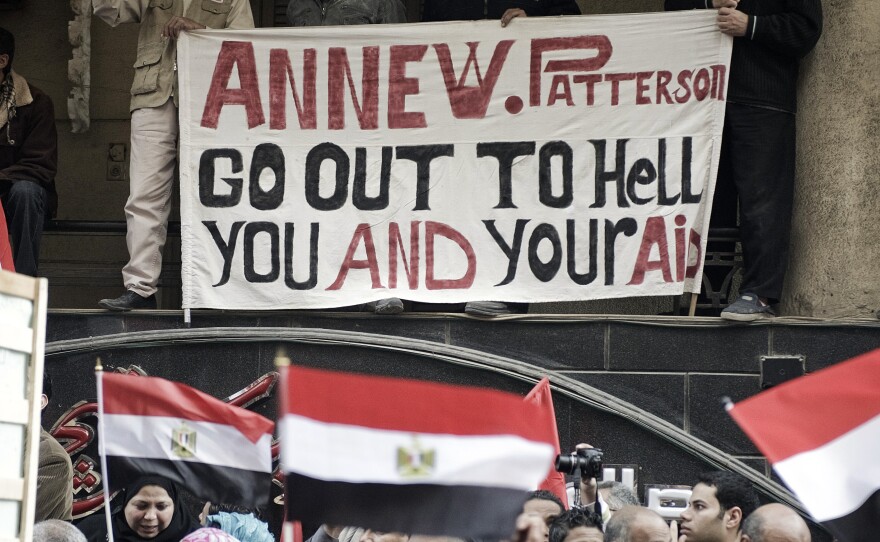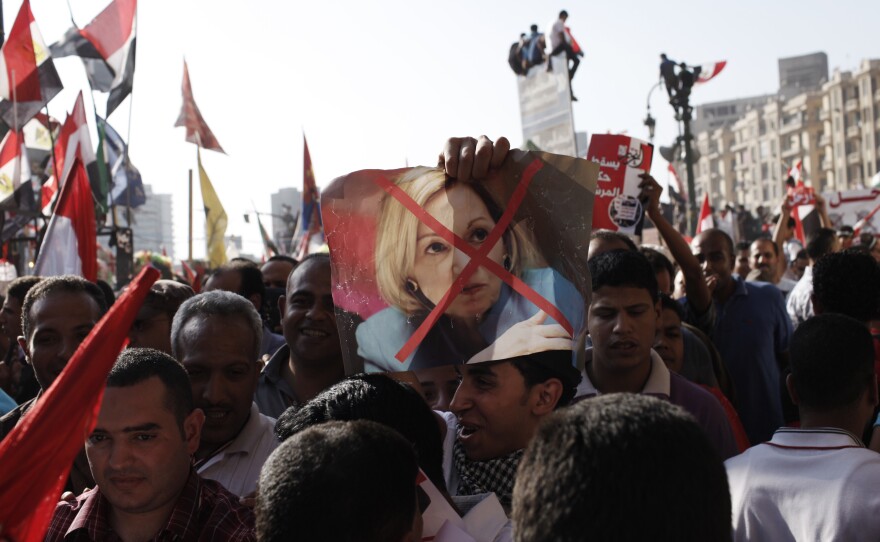


Egypt's crisis has ignited a familiar debate over U.S. foreign policy where the combatants cluster around two basic viewpoints: The U.S. is doing too little, and the U.S. is doing too much.
So which is it? Is America shrewdly orchestrating events behind the scenes, or is it just an impotent bystander in the Egyptian drama? It depends on whom you ask.
In very broad terms, many Egyptians feel the U.S. has a sinister hand in most every development, while many American pundits feel the Obama administration has been unable or unwilling to tap U.S. influence to guide events in Egypt.
"The U.S. ambassador to Egypt wields so much potential influence that Egyptians obsess daily over whom she is meeting, and they concoct wild conspiracies based on trivial events," Robert Kagan of the Brookings Institution wrote in The Washington Post. "The assumption in Egypt, as in much of the Arab world, is that nothing happens unless the United States wills it."
Al Jazeera reported Wednesday that the U.S. State Department has funded a number of private groups that were actively involved in opposing Mohammed Morsi, the democratically elected president who was ousted by the Egyptian military on July 3 following massive street protests.
"This program vigorously supported activists and politicians who have fomented unrest in Egypt," the report said.
Meanwhile, some secular, liberal Egyptians viewed the U.S. ambassador, Anne Patterson, as being too close to Morsi's government and thought she should have been more supportive of the protest movement.
"Some say that street action will produce better results than elections," Patterson said in a June 18 speech. "To be honest, my government and I are deeply skeptical."
The street protesters were outraged, and some carried posters of Patterson to rallies, with her face crossed out with a red X. In their minds, the U.S. was conspiring to keep Morsi and the Muslim Brotherhood in power.
U.S. Takes Neutral Stance
Since Morsi's ouster, the Obama administration has adopted a mostly neutral stance, calling for a quick restoration of an elected civilian government, but not openly criticizing the military's removal of Morsi.
In the U.S., many critics say the Obama administration has been too tepid and should be much more active in Egypt, the Arab world's most populous nation and a long-time U.S. ally.
"It has become fashionable in today's 'post-American world' milieu to argue that the United States had no ability to shape events in Egypt. This is absurd," wrote Kagan, of the Brookings Institution. "The United States is far from being all-powerful, but neither is it powerless."
As is often the case, the worlds' leading superpower gets criticized whatever it does. If the U.S. keeps a low profile, critics say it's not doing enough. If Washington has a high-profile, then it's trying to dictate events.
Then there's the notion that the U.S. has limited influence in Egypt, and all the hand-wringing over U.S. policy is pointless because Egyptians will determine the country's fate, and the U.S. is largely operating on the margins.
"Here we go again. It has been barely a week since the Egyptian military removed Mohammed Morsi from power, and Washington is already knee-deep in the blame game over who's responsible for the current mess and what America must do to fix it," Aaron David Miller, a former State Department official, writes in Foreign Policy.
"The primary reason for Egypt's current travails has much more to do with the choices Egyptians have made and the circumstances those choices have created than the policies of the Obama administration," he adds.
Arab Aid Dwarfs U.S. Assistance
The U.S. debate is now focused on the $1.5 billion that America sends each year to Egypt, most of it in military assistance. U.S. law calls for assistance to be suspended following a military coup. The Obama administration has declined to take a position, saying only that it is studying the matter.
No matter what the U.S. decides, the money already looks like peanuts compared to the sums offered by oil-rich Arab states.
Saudi Arabia, Kuwait and the United Arab Emirates have pledged a combined $12 billion in assistance to Egypt, highlighting the regional battle for influence in an Arab world that has been turned upside down by a series of uprisings over the past two years.
All three of these wealthy nations are monarchies where the royal family has ruled for generations. All are suspicious of rising Islamist movements, like the Muslim Brotherhood in Egypt, and therefore were clearly pleased when Morsi and his allies in the Brotherhood were driven from power.
In contrast, the U.S. position remains fuzzy. Morsi was voted into office in the country's first democratic election, which the U.S. endorsed. But many of Morsi's policies were as unpopular in Washington as they were on the streets of Cairo. This has left the U.S., at least for now, in the muddled middle of the polarizing Egyptian crisis.
Copyright 2013 NPR. To see more, visit www.npr.org.





